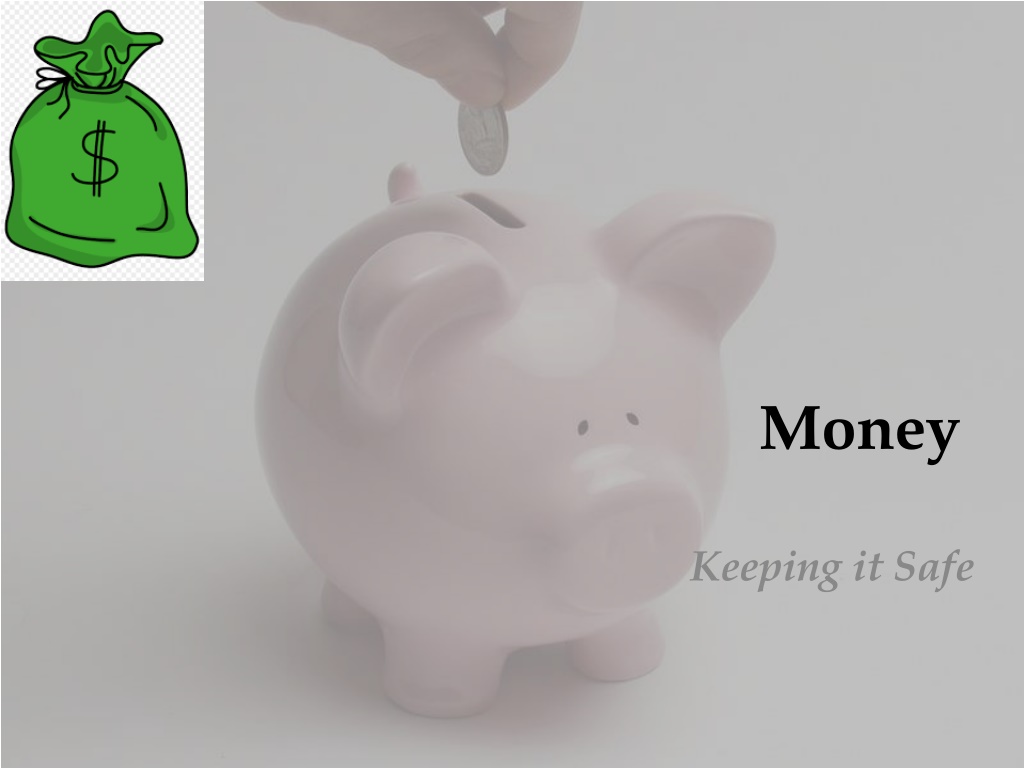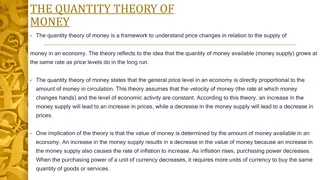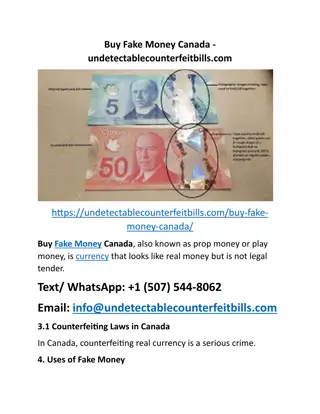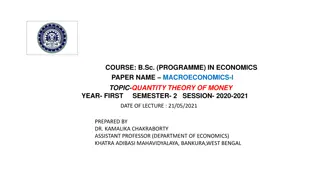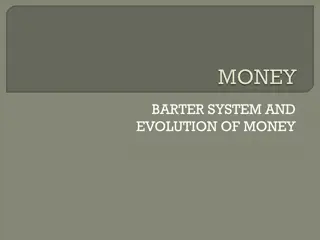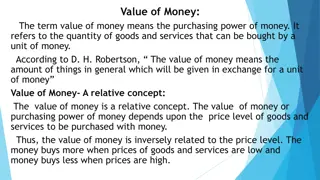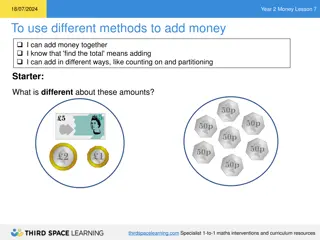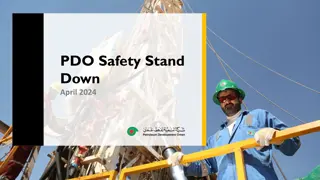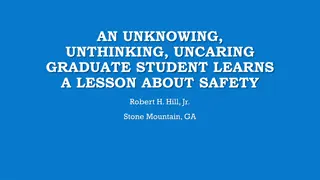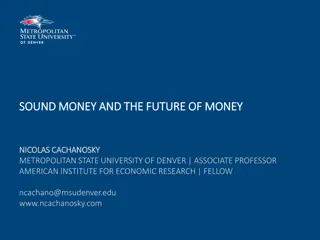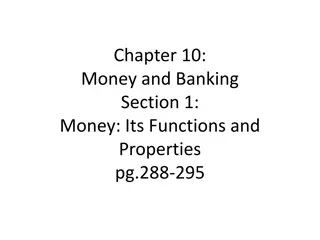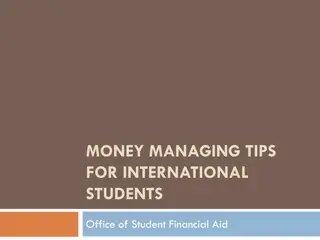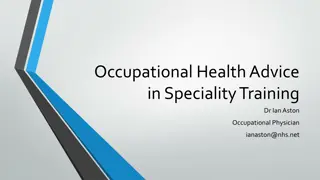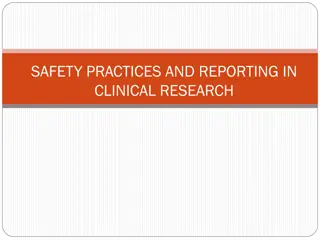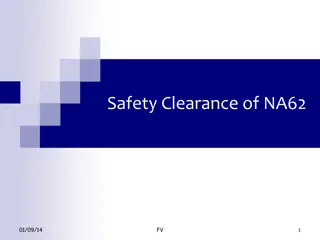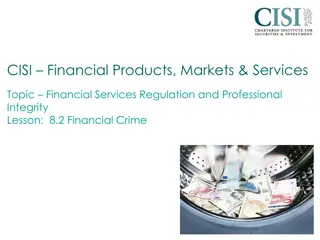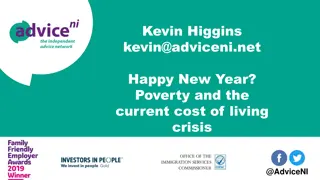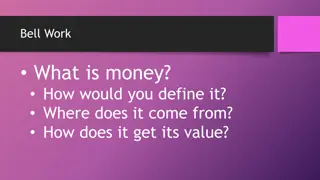Money Safety Tips and Advice for Students
Explore essential vocabulary related to money management, learn about keeping money safe, and discover safety tips for students in a new city. From identifying cash to understanding the importance of safeguarding your belongings, this content provides practical advice for financial security.
Download Presentation

Please find below an Image/Link to download the presentation.
The content on the website is provided AS IS for your information and personal use only. It may not be sold, licensed, or shared on other websites without obtaining consent from the author. Download presentation by click this link. If you encounter any issues during the download, it is possible that the publisher has removed the file from their server.
E N D
Presentation Transcript
Money Keeping it Safe
Money VOCABULARY
1a, page 84, Look at these words in the box. Check any new words in your dictionary. Which two are cash? cashpoint cheque coin credit card note PIN number purse wallet
purse/ps/ 1. BrE = wallet 2. AmE = handbag
coins/change metalni novac/sitni Keep the change = zadr i kusur
pickpocket pocket money d eparo d eparac
1b page 84, Make true sentences, using the words above. Compare with a partner. 1. I ve got/I haven t got a lot of___________. 2. I don t often use _____________. 3. There are a lot of ______ in my ________ . 4. It s easy/difficult to remember my _______ . 5. I always destroy old ____________ . 6. _____ is/are more useful to me than ______ .
page 84 READING
2 page 84, Look at the poster below. Where can you see it? Sheffield Metropolitan University International Students! Are you new to this city? Are you worried about: * keeping your money safe? * going out at night? * using taxis alone? * people stealing your mobile?
2 page 84, Look at the poster below. Where can you see it? Come along to a talk by Sue Cutler. Sheffield Met International Student Welfare Officer Staying safe: looking after yourself and your money Wednesday 3 October Peak building Lecture Theatre 4 p.m. Tea and Biscuits from 3.30 p.m. Everyone welcome!
3 page 85, Are these sentences about the talk true or false? 1. The talk is for all students of the University. 2. The talk is only about money. 3. Sue Cutler works for the University. 4. The talk is on Wednesday morning. 5. There is nothing to eat or drink there.
3 page 85, answers 1. The talk is for all students of the University. T 2. The talk is only about money. F 3. Sue Cutler works for the University. T 4. The talk is on Wednesday morning. F 5. There is nothing to eat or drink there. F
page 85 LISTENING
4. page 85, track 2.29, transcript page 154 Read these sentences, then listen to the first part of Sue s talk and choose the best summary. 1. The city is dangerous and it s important to be very careful with your money. 2. The city is safe, but it s important to be careful with your money. 3. The city is safe, so it s not important to be careful with your money.
5 page 85, track 2.30, transcript page 154, Now listen to the rest of Sue s talk and fill the gaps. You should be careful ______ ________ places. 2. You should keep your ______ ________ safe. 3. You shouldn t keep your _______ in your back pocket. 4. You shouldn t carry a lot of ___________ . 5. You shouldn t take your money out in a ______ _________ places.
5 page 85, track 2.30, transcript page 154, answers You should be careful in crowded places. 2. You should keep your PIN number safe. 3. You shouldn t keep your wallet in your back pocket. 4. You shouldn t carry a lot of cash . 5. You shouldn t take your money out in a busy public places.
6. page 85, Look at what these people say. Do they follow Sue s advice? I can never remember my PIN numbers so I keep them on a piece of paper in my wallet. I always carry my wallet in my inside jacket pocket. 3. I don t like cheques or credit cards so I always carry a lot of cash. 4. I sometimes check how much money I ve got in my purse when I m on the bus.
should, shouldnt GRAMMAR
7. page 85, Look at the examples and explanations. Answer the questions below Examples Explanations You should be careful. He shouldn t put his money in his back pocket. Should I wear a money belt? It s the right thing to do. It isn t the right thing to do. Is it the right thing to do? 1.Do we add s to should after he, she and it? 2.Can you think of another verb with grammar like this?
8. page 85, Complete the sentences with should or shouldn t and the verb. 1. Should I keep this money? I found it in the street. (I/keep) 2. _________ to the restaurant on your birthday the food is really bad. (you/go) 3. Max lost his wallet yesterday. - ________ more careful with his money. (he/be) 4. ________ a new camera. Her other camera is only six months old. (she/buy) 5. Someone stole my purse from my car. - ______ the police. (you/tell) 6. __________ all our money on a round-the-world trip or on a swimming pool in the garden? (we/spend)
8. page 85, answers 1. Should I keep this money? I found it in the street. (I/keep) 2. You shouldn t go to the restaurant on your birthday the food is really bad. (you/go) 3. Max lost his wallet yesterday. He should be more careful with his money. (he/be) 4. She shouldn t buy a new camera. Her other camera is only six months old. (she/buy) 5. Someone stole my purse from my car. You should tell the police. (you/tell) 6. Should we spend all our money on a round- the-world trip or on a swimming pool in the garden? (we/spend)
9. page 85, Look at some more problems of international students in the UK. Give them advice with should and the ideas in the box. don t use your computer late at night go out in a group join a sports club watch TV and practise listening 1. I don t know any British people. 2. I can t understand what British people say. 3. I don t feel safe in the city. 4. I send emails to my friends back home until 2 am, and then I can t sleep.
page 85 SPEAKING
10a page 85, Work with a partner. Think of some advice for Nadia. I m a student in London. This is a very expensive city and I don t get a lot of money: my parents pay my university fees but they can t afford to give me any extra money. I have a part-time job in a restaurant, but it doesn t pay very much. I m using my credit cards a lot and now I m in debt. What should I do? Nadia
10b page 85, Look at page 121 and check your advice. Then give advice to the other people on that page. Dear Nadia, I m sorry to hear about your problems. I think that you should try to find a better job. Supermarkets usually restaurants. You shouldn t use your credit cards to buy things they re very expensive. You should talk to your teachers at the university they can help you. pay more than
1 I m a student from China . I m now living in the UK. I m sharing a flat with three other Chinese students. We re afraid to go out after dark because we can hear a lot of police cars. We don t think the city is safe. What should we do? Li
2. I m a student from Poland. I m learning English, but I find it very difficult to remember new vocabulary. What should I do? Veronica
3. I m from Germany and I m spending a year in London. I have a lot of friends and I go out a lot. I like eating in expensive restaurants and going to the theatre. The problems is, I m an ordinary office worker and I haven t got much money. What should I do? Klara
11. Write a reply to one of the people in page 121. Sample answer Dear ...., I understand your concerns. In my opinion, you should.... I would try.... How about ....? All the best,
page 85 WRITING
HW, page 140-141 Read about the verb SHOULD in Language Reference, G1 page 140 Do exercises G1 1,2&3 in page 141
